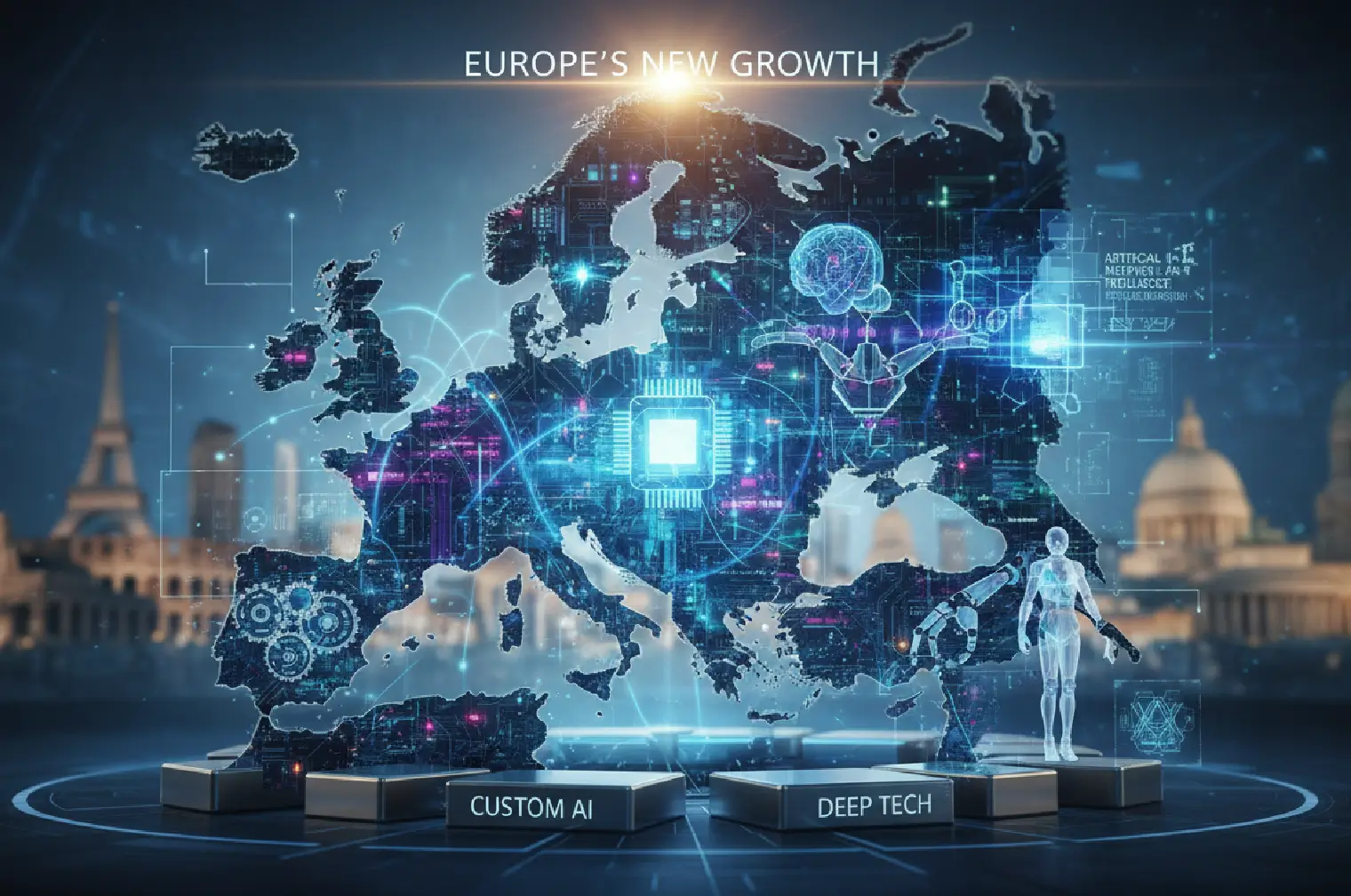Let’s face it: the era of simple digitization in Europe is over. We are now entering the age of Deep Tech.
For years, the narrative was that Europe lagged behind the US and China. But the data tells a new story. In 2024, Europe officially overtook Asia in deep tech investment capital, capturing nearly one-third of all venture capital on the continent. We aren’t just building apps anymore; we are building the “infrastructure of tomorrow”—from sovereign AI models like Mistral to advanced industrial robotics.
For business owners and CTOs, this macro-shift signals a critical opportunity. The convergence of world-class research, the EU AI Act’s regulatory clarity, and a hunger for technological sovereignty has created a unique environment. The challenge is to integrating these complex, novel AI systems into legacy European infrastructures to drive real economic value.
What’s Driving Deep Tech’s Rise Across Europe Today?
The surge in European Deep Tech is a structural shift driven by necessity and capability.
First, there is the push for European AI Sovereignty. Reliance on external tech giants is becoming a strategic risk for European enterprises. The rise of local champions like Mistral AI (recently backed by ASML) proves that Europe is serious about owning its own intelligence layer. This enables businesses to establish a foundation on platforms that align with European values and data privacy standards from the outset.
Second, the regulatory landscape has matured. While some view the EU AI Act as a hurdle, smart enterprise leaders see it as a roadmap. By establishing clear rules for “high-risk” AI, the EU has actually lowered the uncertainty for B2B adoption. Companies can now invest in AI automation knowing exactly what the guardrails are, effectively turning compliance into a competitive advantage against unregulated global competitors.
Accelerate Growth with Deep Tech Innovation
Strengthen your enterprise with future-ready Deep Tech strategies and Custom AI Solution capabilities.
How Does Deep Tech Unlock New Value for European Businesses?
Deep tech differs from standard IT in that it addresses tangible, scientific, or engineering problems, rather than merely enhancing user interfaces. For a European CEO, this translates to value that is defensible and hard to replicate.
Here is how custom AI solutions Europe drive that value:
- Predictive Operational Sovereignty Standard software reports what happened; deep tech predicts what will happen. By processing vast datasets locally, businesses can optimize supply chains and energy usage with 90%+ accuracy without exposing sensitive data to non-GDPR-compliant cloud servers.
- Regulatory-First Automation With “compliance by design,” intelligent automation tools can handle complex workflows—like financial risk assessment or healthcare triage—while automatically generating the audit trails required by EU law.
- Hyper-Personalized Client Experiences Deep tech allows for “Novel AI” applications that adapt in real-time. Instead of static chatbots, businesses can deploy large language models (LLMs) fine-tuned on their specific proprietary data to resolve client issues instantly.
- Industrial Efficiency (Industry 4.0) For Europe’s manufacturing core, deep tech integrates computer vision and edge computing to detect defects that human eyes miss, drastically reducing waste and increasing production velocity.
| Standard IT Adoption | Deep Tech Transformation |
| Digitizes existing manual processes | Re-engineers processes using predictive intelligence |
| Uses off-the-shelf, generic software | Uses custom AI solutions trained on proprietary data |
| Reactive decision making | Proactive, algorithmic decision making |
| Focus on user interface (UI) | Focus on underlying problem solving (R&D) |
What Does Successful Deep Tech Implementation Look Like?
Theory is good, but execution is what matters. Consider the logistics and manufacturing sectors—the backbone of the European economy.
Imagine a mid-sized European logistics firm struggling with volatile fuel costs and unpredictable delivery windows. Standard “digital transformation” might involve buying a better dashboard. A Deep Tech approach, however, involves building a custom machine learning model that ingests historical traffic data, real-time weather patterns, and fluctuating fuel prices.
By deploying this Intelligent Automation, the firm doesn’t just see the delay; the system autonomously re-routes fleets in real-time to minimize fuel burn. The result isn’t just a 5% time saving; it’s a fundamental restructuring of the cost base and a massive leap in service reliability. This is the power of moving from “software” to “solutions”—specifically, solutions that understand the unique constraints of European infrastructure.
Unlock Efficiency with AI Automation
Automate core operations and scale seamlessly with ViitorCloud’s enterprise-grade AI Automation solutions.
How Does ViitorCloud Engineer Deep Tech Success?
At ViitorCloud, we engineer outcomes. We understand that European businesses need partners who can navigate both the technical complexity of AI and the regulatory nuance of the EU market.
Our approach to custom AI solutions is structured to minimize risk and maximize impact:
- AI Readiness & Strategic Consulting: We begin by assessing your data infrastructure and “sovereignty readiness.” We identify exactly where AI can drive ROI versus where it’s just a distraction.
- Custom Model Development: We don’t force your data into a generic black box. We develop and fine-tune models (ML, NLP, or Computer Vision) specifically on your proprietary datasets, ensuring the IP remains yours.
- Compliance-Ready Integration: Our engineering teams build with the EU AI Act in mind. From explainable AI (XAI) to data lineage tracking, we ensure your deep tech adoption is audit-proof.
- Scalable Enterprise Deployment: We move quickly from Proof of Concept (PoC) to production, integrating these new intelligence layers seamlessly into your existing ERP or CRM systems to ensure business continuity.
- Continuous MLOps Optimization: AI models degrade if not maintained. We provide ongoing monitoring and retraining services to ensure your automation remains sharp and accurate as market conditions change.
Conclusion
The “wait and see” period for AI in Europe has ended. With €15 billion flowing into the deep tech ecosystem in 2024 alone, the infrastructure for European AI Sovereignty is being built right now.
For business leaders, the opportunity is clear: leverage this new growth engine to transform your company from a digital player into an intelligent market leader. The combination of Europe’s engineering DNA and the new wave of Enterprise AI adoption provides a rare window to build defensible, high-margin competitive advantages. But this requires more than just software; it requires a partner who understands the deep tech landscape.
Let’s build your custom AI roadmap today. Contact us at [email protected] and schedule your consultation.
Build Smarter Systems with Custom AI Solutions
Enhance decision-making and product capability with scalable Custom AI Solution engineering.
Frequently Asked Questions
Deep tech refers to technologies that address substantial scientific or engineering challenges—such as advanced AI, robotics, or quantum computing. For enterprises, it means moving beyond simple digitization to solving core operational problems using proprietary, defensive technology.
Off-the-shelf AI is often too generic for complex European industries. Custom AI solutions are trained on your specific data, allowing you to automate niche processes, predict unique market trends, and serve customers with a level of precision that competitors using generic tools cannot match.
Yes, if built correctly. The EU AI Act categorizes risk; most B2B automation falls under “low” or “limited” risk. However, high-risk use cases (like HR or critical infrastructure) require strict governance. Partnering with an expert like ViitorCloud ensures your automation is “compliant by design”.
Investment is stabilizing, talent is maturing, and competitors are moving. With Europe’s deep tech ecosystem now valued at potentially $1 trillion in future growth, waiting to adopt these technologies risks leaving your business behind in the legacy economy while the market shifts to intelligent operations.

Vishal Shukla
Vishal Shukla is Vice President of Technology at ViitorCloud Technologies.
